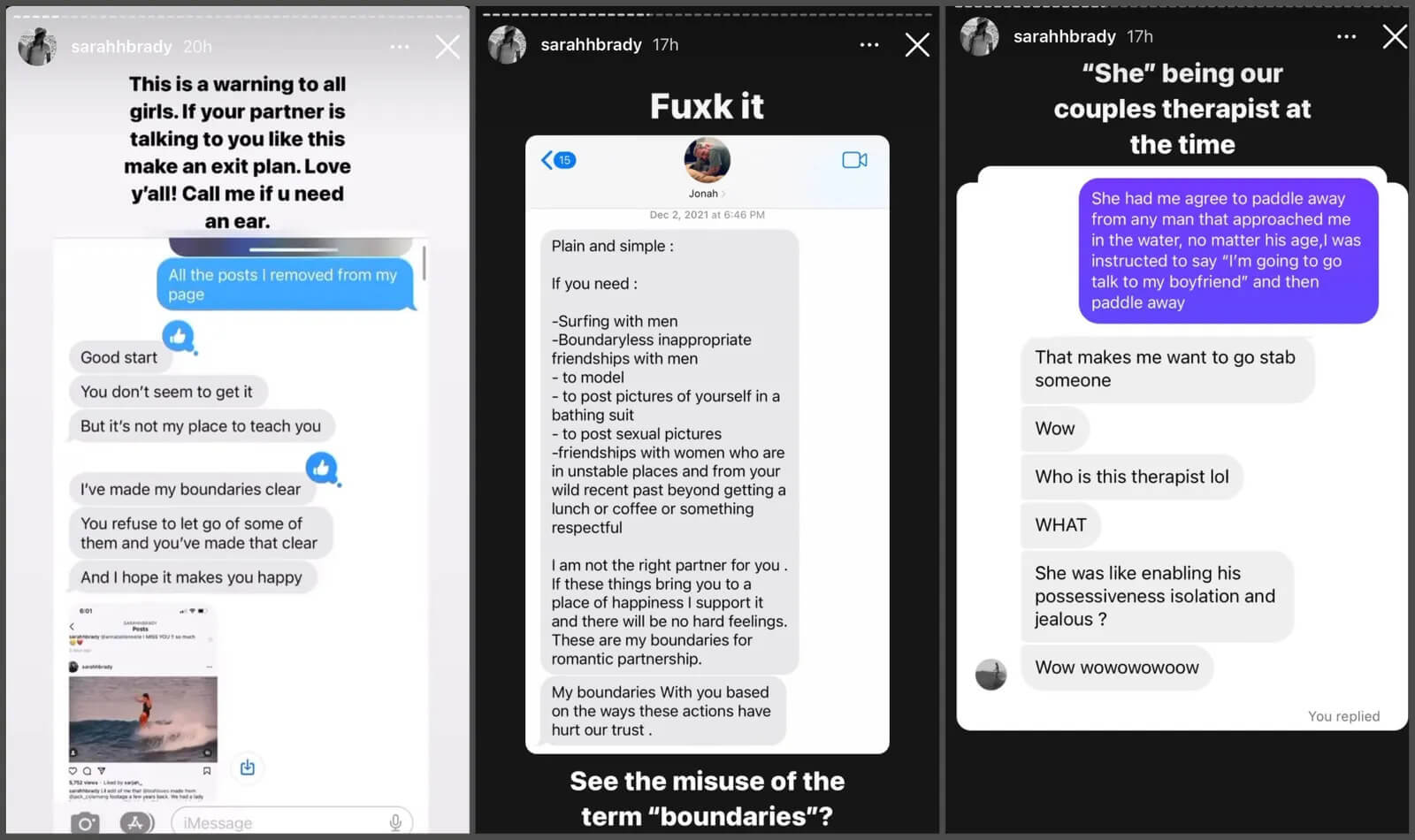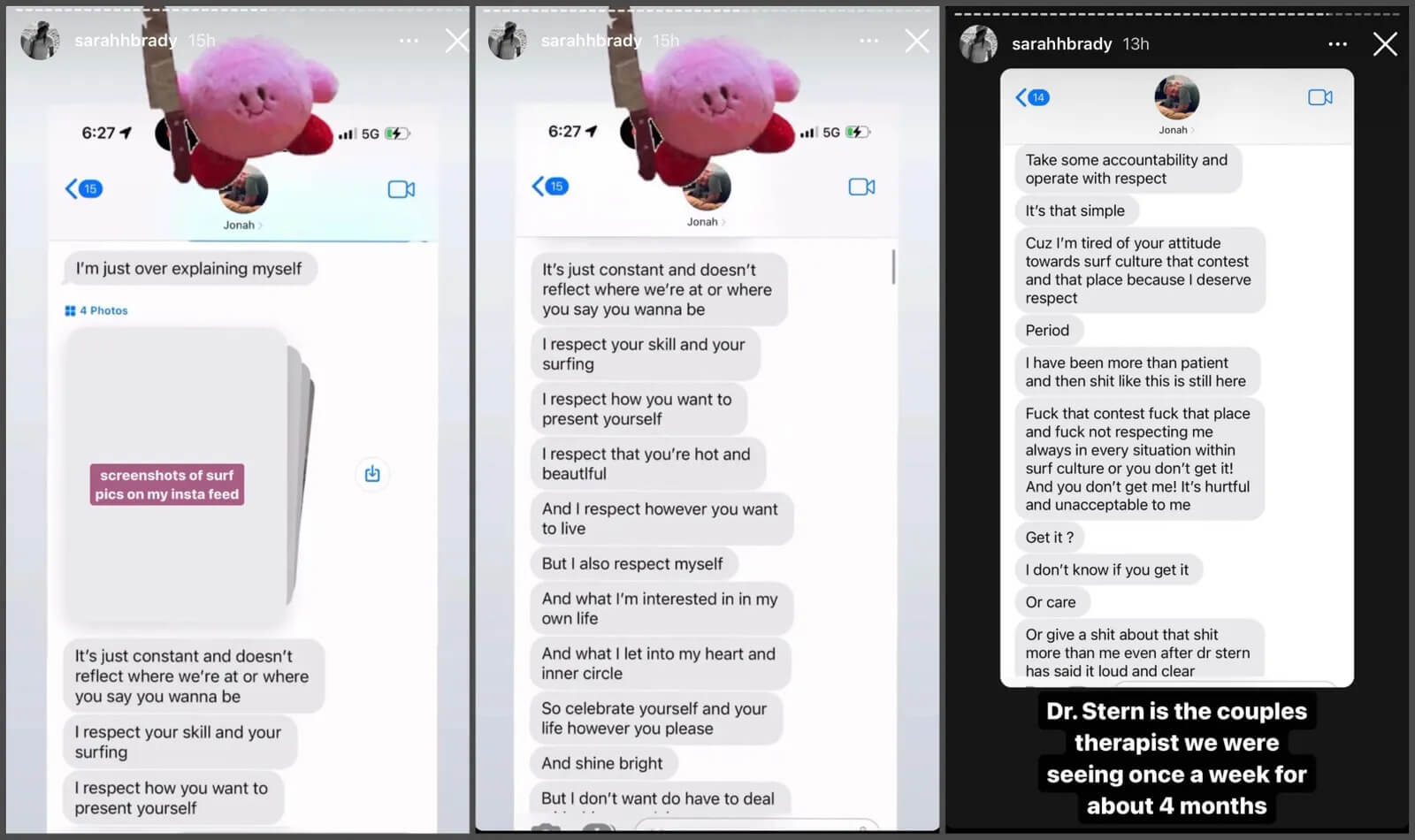Was Jonah Hill’s ex-girlfriend wrong to share texts showing his abuse?
The Internet exploded over alleged texts from the Jewish actor displaying controlling behavior

Jonah Hill and Sarah Brady attend the world premiere of Netflix’s “Don’t Look Up” on December 05, 2021 in New York City. Photo by Mike Coppola/Getty Images
I had already logged off for Shabbat this past Friday, so I missed the precise moment when Sarah Brady, a professional surfer and former girlfriend of Jewish actor Jonah Hill, began sharing on her Instagram stories a series of screenshots of alleged texts between her and Hill from when the couple was together.
The couple dated in 2021 for about a year, with Brady on Hill’s arm in matching suits for the Don’t Look Up premiere — notable given Hill has largely stopped attending publicity events for his projects due to his anxiety.
Hill has a reputation as an NJB, or “nice Jewish boy,” having vaulted to fame through early aughts Judd Apatow comedies and is now a multi-hyphenate actor, writer and director. His most recent film is a documentary he made about his love for his therapist (possibly the most Jewish film ever made). Yet the Jonah Hill that Brady’s texts revealed was narcissistic, controlling and abusive.
Amid the internet uproar over Hill’s behavior, there was a significant backlash at Brady’s airing of her former relationships’ dirty laundry. I personally have yet to find a satisfying answer to the question of lashon hara, or slanderous speech, in relation to #MeToo, and the power imbalance inherent in so many abusive relationships.
Hill berated Brady for posting revealing photographs of herself in bikinis and insisted that she remove them from her social media accounts. He demanded that she not model, not surf with men or have male friends, and not be friends with “women who are in unstable places from your wild recent past beyond getting lunch of [sic] coffee or something respectful.”

Social media was already aflame with women rushing to support Brady, with memes mocking Hill’s “boundaries” and Instagram slideshows educating the masses about Hill’s weaponization of “therapy-speak” when New Yorker columnist Emily Nussbaum waded into the discourse, and inadvertently, introduced the concept of lashon hara.
“It’s gross to post your ex’s private texts unless you have a really solid reason to do so — and this holds true even if your ex was a thin-skinned, manipulative weasel. That used to be a given, but clearly isn’t anymore,” Nussbaum tweeted.
It’s gross to post your ex’s private texts unless you have a really solid reason to do so—& this holds true even if your ex was a thin-skinned, manipulative weasel. That used to be a given, but it clearly isn’t anymore
— Emily Nussbaum (@emilynussbaum) July 9, 2023
What Nussbaum essentially was articulating is a key concept in Jewish tradition. Prohibited based on an injunction from Leviticus (“You shall not go up and down as a slanderer among your people”), the evils of gossip, and speaking badly about other people, are articulated throughout Jewish texts.
What was already a viral story became even more charged after Nussbaum’s tweet, which currently has over six million views. Women replied angrily to Nussbaum, some with more ferocity than others, arguing that she was prioritizing a man’s right to privacy over a woman warning others of abuse. Writer Moira Donegan wrote: “…because so much of men’s interpersonal mistreatment of women happens in the ‘private’ sphere, too much respect for the sanctity of ‘privacy’ would make a lot of feminist conversations basically unspeakable.”
I see that argument —it happened to me once, and sucked! But I think because so much of men’s interpersonal mistreatment of women happens in the “private” sphere, too much respect for the sanctity of “privacy” would make a lot of feminist conversations basically unspeakable.
— Moira Donegan (@MoiraDonegan) July 9, 2023
There has been ample rabbinic and communal conversations since the #MeToo movement began on the intersection of lashon hara and the very issue that Donegan pinpoints, that is, that abuse thrives in silence. Rachel Sandelow-Ash, in a piece for Lilith titled “In Defense of Lashon Hara: Why Gossip is a Feminist Imperative,” argued that gossip protects women from abusers. Sandelow-Ash also points out that rabbinic commentary prohibiting gossip comes from entirely male sources, as women were not allowed to study Talmud or participate in politics.
“When and where women could not talk about ideas,” she writes, “they talked about people: a topic of conversation that the rabbis termed gossip.”

Some would argue that the veracity of the gossip being shared is irrelevant. In a 2020 Collegiate Moot Beit Din — a mock trial argued according to Talmudic law — participants debated the halachic acceptability of “whisper networks,” or informal groups of people that warn others of abusers. “We have to have a very good reason for public humiliation,” one student stated, a bar that Brady, who was not physically abused by Hill, seems not to have met.
On the other hand, in the same trial, others argued that the normal standards of lashon hara only applied in situations where “the accuser and the accused are of similar social standing.” Figures like Harvey Weinstein and Les Moonves (and Hill) were unequivocally in a more powerful position than those accusing them, and their efforts to wield said power to silence the accusers have been amply documented. Hill has not commented publicly on Brady’s Instagram stories, but a 39-year-old Hollywood star with an estimated net worth of $70 million indisputably has more clout and resources at his disposal than a 25-year-old semi-professional surfer.
I can’t help dwelling on one of Brady’s Instagram stories, where she posted a screenshot of a text message exchange between her and her mother. In the text, Brady wrote that “His name would always be tied to mine for the rest of my life no matter what. I’d rather it be tied to mine with the truth than without.”
I, unfortunately, have also had an abusive experience with an ex who, coincidentally, was also an actor. He was a well-known mainstay of the New York comedy scene, and has appeared on a critically acclaimed television show, but is nowhere near as famous as Hill. However, when the series aired and I saw him in the trailer, I felt nauseous. It felt like he was suddenly everywhere, and it killed me that a show I happened to love was now tainted. I skipped the episodes he was featured in, and, thankfully, his career did not take off.
As I watch Brady’s Instagram stories, however, I couldn’t help but wonder what it would be like if my ex’s fame had skyrocketed, if his name became synonymous with talent and success. I, too, would have more strongly considered speaking publicly about my experiences. I, too, would want my name to stand on its own.















